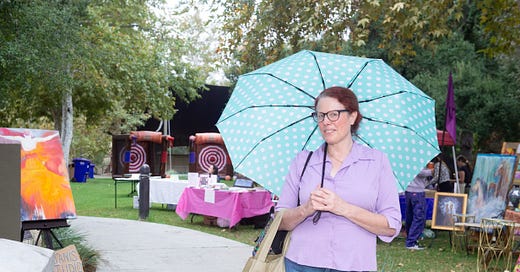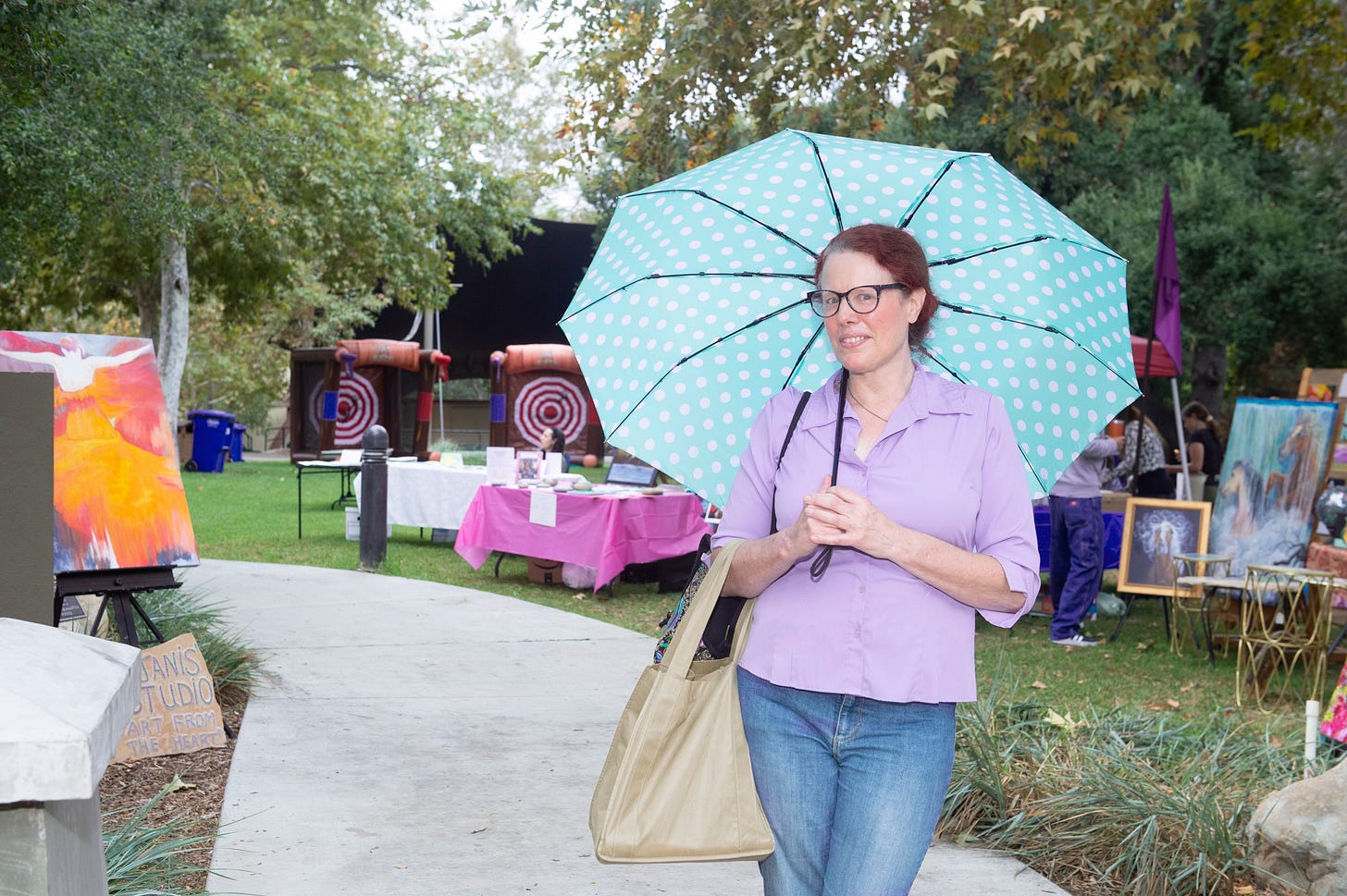The Auti Peri Q&A: Jennifer Brown
"I know I’m not alone, but I don’t have anyone who can relate, except on a superficial level."
Hi, I’m Sam (she/her). A late diagnosed neurodivergent woman, a tenacious midlife struggler, and an advocate for people in autistic perimenopause here at The Autistic Perimenopause: A Temporary Regression AKA The Auti Peri.
I am delighted to be the host of The Auti Peri Q&A Series!
In this series, I host a Q&A interview with a fellow autistic person about their experience of the menopause transition.
Everyone’s experience of the autistic menopausal transition is different. I aim to elevate the voices, lived experiences and reflections of autistic people’s menopausal transition.
Autistic perimenopause is a highly individual, dynamic and sometimes prolonged life stage caused by reproductive hormonal fluctuations. As autistics can be highly sensitive to bodily and environmental, we may experience fluctuations as physical, psychological and cognitive symptoms.
Academic research into auti peri is in it’s early stages, yet it is a matter or urgency that we bust the social taboo and get used to talking about this.
Fun fact: The Autistic Perimenopause: A Temporary Regression is fuelled by caffeine. If you would like to buy me a coffee, the QR code above will take you to my page. Thank you! ☕️
Today’s guest is Jennifer Brown (she/her). Jennifer AKA J. J. Brown is the published author of ‘How to Bury the Undead’ and a writer here on Substack at Take Ten with Jen.
“Writer, editor, adventurer, equestrienne, bookworm, autistic, award-winning author of How to Bury the Undead. Not necessarily in that order.”
Jen lives in Southern California. You can also find her over on Bluesky 🦋
Pen to Mat Using Yoga and Journaling to bring balance to your mind, body, and creative self.
What does “autistic perimenopause” mean to you?
Well, to be frank, as a late diagnosed autistic person, I don’t really know.
I know that perimenopause is the precursor to menopause, but how it affects me as an autistic person, I can’t really say.
I’ve never had the safety or support to actually be autistic although I was formally diagnosed in 2019, aged 49.
When did your autistic perimenopause symptoms start and what were they?
I don’t know. My inner temperature always ran hot, ever since I was a kid (I’m prone during hot weather beginning at 78 degrees F), and I prefer colder temps, to the point that it shocks others.
I have a fan going 24/7 almost every day, even in winter (to be fair, I live in Southern California, but it does have days where it gets unusually cold and frosty).
My menstrual cycle ended after June 2022. My periods had always been really heavy with lots of clotting, and when they stopped I felt relieved. I always wanted to rip my uterus out because I was so tired of having my periods. When I was a teenager for a number of years they were so bad I would soak through my bedsheets every night. They were irregular and unpredictable, and I hated every single minute of it. I hated being a girl because of the periods, and for getting unwanted attention from men.
My menstrual cycle started regulating around my early thirties into a predictable pattern, but they were always really heavy. My final period happened when I was travelling overseas through Amsterdam and on safari in Kenya, and it was so obnoxiously heavy! But luckily it was short and only lasted five or six days. I passed on my leftover sanitary products for the girls at a school in a local Kenyan village.
What happened when you presented with autistic menopause to a healthcare professional?
I don’t know that they would have recognized it, especially if I didn’t.
I have learned to be very vocal. I have had a few doctors in the past four years, and my current doctor is a younger woman than I am. I have to put my foot down to explain that my cortisol dysregulation is causing some symptoms currently such as weight gain, gut issues and anxiety. I don’t know if that the cortisol is a precursor to these issues or vice versa.
My nervous system is a red hot mess.
What has your treatment protocol been in managing your autistic menopause?
I practice yoga, take walks, spend time with horses, ride my bike (it’s cute and it makes me happy). I’m looking into meditation techniques.
I am not using hormone replacement therapy but I drink tea daily with soy milk in it. My best friend who has an interest in homeopathy recommended soy milk, as she said it helps create oestrogen in the body.
How has your everyday life been impacted by autistic menopause (your caring/employment responsibilities, hobbies, relationships etc.)?
Again, I don’t know if it’s perimenopause or just plain autistic burnout. I’m tired all the time (naps are my new best friend), but I feel like it’s helped to regulate my nervous system.
I do know that I can no longer work in the traditional sense for someone else, so I’m looking for remote work, or freelance, and creating my own business as a writer/editor.
I am a certified yoga instructor, and I help women to reconnect with themselves using the combined practices of movement and journalling (Pen to Mat).
I also find it harder to focus and discipline myself to do the things I enjoy. I have a very short window of energy to do anything. It worries me, but I think it's functional freeze and I'm consciously trying not to get down on myself about it.
Every little step taken is still moving forward and other people's timelines on where I should be are theirs, not mine.
Are there things that make or have made your menopause transition especially difficult for you as an autistic person? If so, what kinds of things?
I say “I don't know” an awful lot, but my experience has been not to rely on anyone and to just muddle through whatever difficulty I'm experiencing. This has been ongoing since childhood, and, in recent years, asking for help in the professional sphere has resulted in a lot of gaslighting and bullying (depending on the job).
I also don't feel like I deserve any support, because I've managed to do all the neuro-difficult, er, typical, things in life, so how could I possibly need accommodations or support?
Anyhow, finding that I'm not alone has been reassuring.
Are there things that could have made your menopause transition easier for you as an autistic person? If so, what kinds of things?
Knowing that I was autistic a lot earlier might have helped me to recognize things better.
Having a better support group, who understands autism. Not that the people in my life don’t, but I do feel isolated.
What supports, resources and services are available to people experiencing autistic perimenopause where you live?
I don’t know.
What kinds of services, resources or supports would you find most helpful?
Being paid to exist, lol. Um, having a network of fellow autistics with similar challenges and experiences – I know I’m not alone, but I don’t have anyone who can relate, except on a superficial level.
What is the easiest way for you to access information about autistic menopause?
Google, I guess.
I didn’t even know it was a thing, until I came across your page.
What do you wish you had known about autistic perimenopause before it started?
I wish I had known to pay attention to my instincts a little more. I wish I was a lot more assertive with my doctors when I was younger.
Is there anything else you’d like to share regarding your autistic experiences of menopause?
Do not recommend! Not for the faint of heart!
I hope you have enjoyed this Q&A. If you would like to be featured as part of this series, please message me. I’d love to share your story!








Same. Sigh. I don't know. But the pressure is on me to be the one that DOES know. Is it worth telling anyone about the cortisol thing?